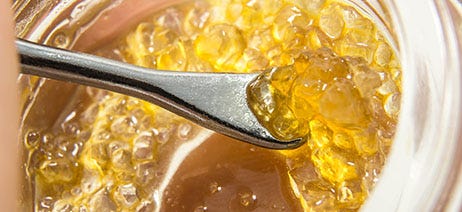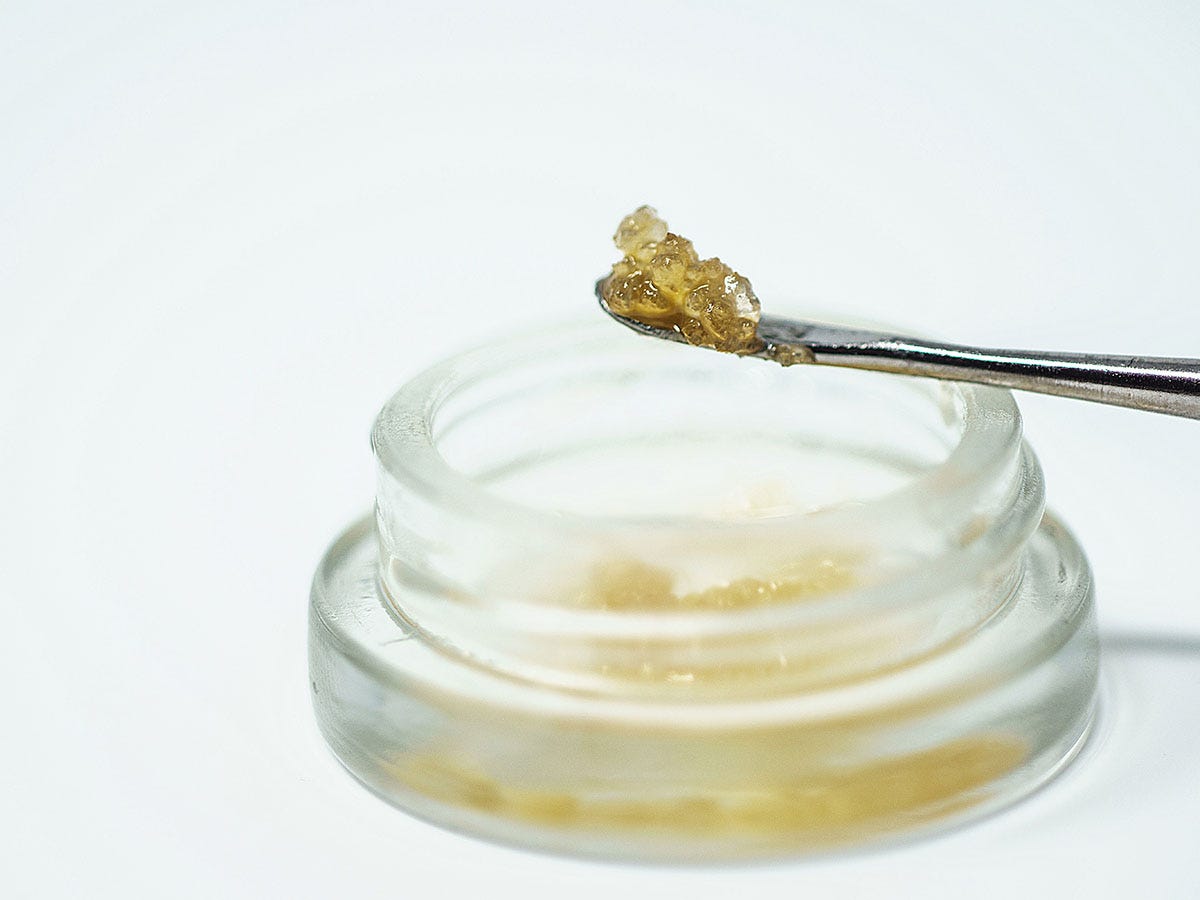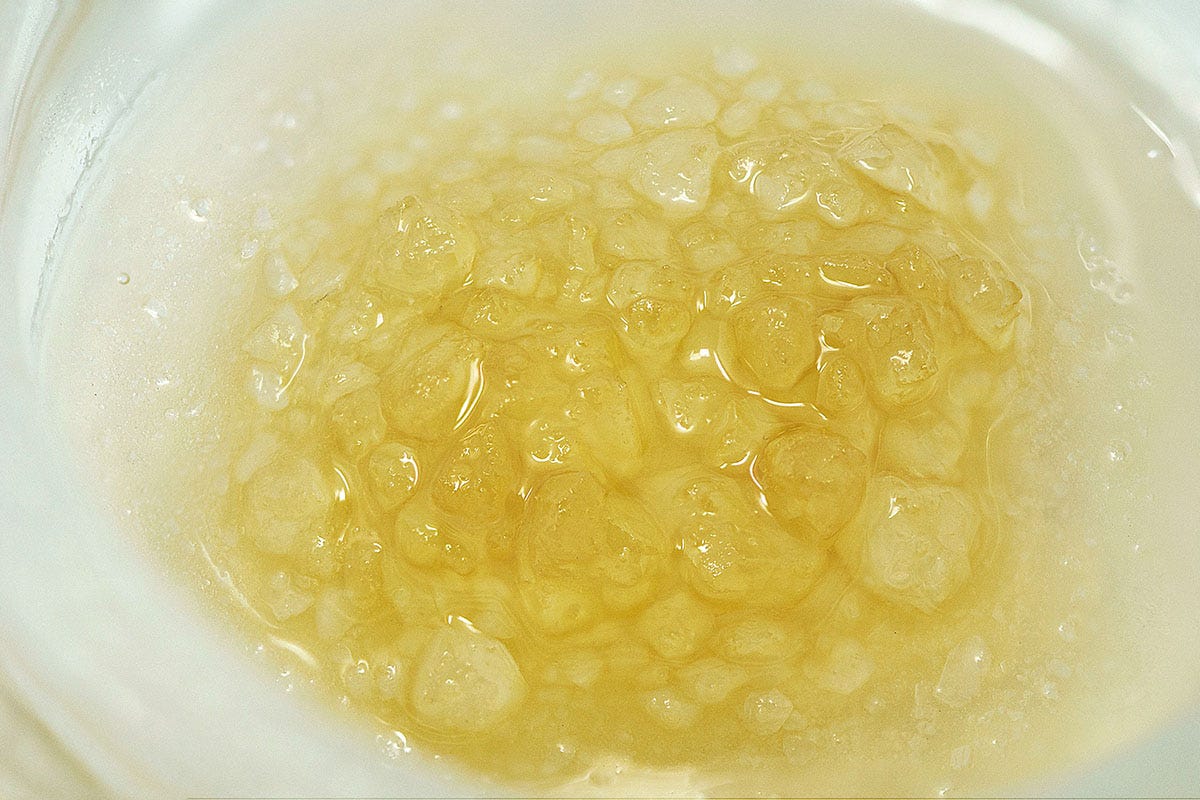
What Is Terp Sauce & How Is It Made?
There are a lot of cannabis products out there, including concentrates, available on the market today, but there’s one that is a favorite among cannabis enthusiasts who love the rich flavors and aromas that terpenes provide. That concentrate? Terp sauce. In this guide, we’ll share everything we know about this syrupy delight, including:
- What Is Terp Sauce?
- How is Terp Sauce Made?
- What Are the Differences Between Terp Sauce and Other Concentrates?
- How Do You Smoke Terp Sauce?
- Terp Sauce FAQs
What Is Terp Sauce?
Terp sauce is a cannabis concentrate with a soaring terpene content, making it one of the most flavorful and aromatic products on the market today. In fact, terp sauce is typically made up of about 40% terpenes, as well as roughly 50% THCA (the precursor to THC) and other cannabinoids.1 Terp sauce is thick and syrup-like, with a slightly chunky, sticky texture to it. Those chunks are actually the cannabinoid crystals in a liquid terpene bath.
While “live resin sauce,” “terp sauce,” and “sauce” are the most commonly used names for this product, you may also see terp sauce referred to by its more formal names—a high terpene, full-spectrum extract (HTFSE) or just a high terpene extract (HTE).2


How Is Terp Sauce Made?
There are a couple ways to make terp sauce, one of them involving a solvent and one of them being solventless. With a solvent-based extraction, solvents like butane are pushed through flash frozen (this is the best type of cannabis to use for this product) cannabis. This extracts the terpenes and cannabinoids from the plant material. The terpenes can further be separated from the cannabinoids, leaving a rich, liquid concentrate that smells incredible.3
Once the terpene solution is purged of the solvent (and the same process is done to the cannabinoids), the two can be put together again in the form of a sticky liquid that coats little crystals. Terpenes and cannabinoid crystals can also be turned into just a liquid that is then added to sauce cartridges.3
With a solventless extraction technique, the process is similar except it uses heat and time (and patience) instead of solvent to separate the terpenes and cannabinoids from the plant material. This is the only method DIYers can safely use. If you’re opting to purchase a terp sauce made using solventless extraction, be prepared to spend some serious coin because the process takes a long time and that translates to a higher cost for the cannabis consumer.


What Are the Differences Between Terp Sauce and Other Concentrates?
With so many concentrates on the market, it might feel impossible to keep all of them straight. Here are a few of the most popular concentrates and how they stack up against THC terp sauce:
Terp Sauce vs. Distillate
The key difference in terp sauce versus distillate is in how and why they’re made. Distillate is a marijuana product that suspends a single cannabinoid—THC—in oil through a solvent-based extraction process. Because of this, there are no terpenes in THC distillate.
Terp sauce is created to preserve all cannabinoids and terpenes, so it contains a variety of both.
Terp Sauce vs. Live Resin
Terp sauce and live resin are actually very similar. Both come from flash frozen cannabis (though technically, terp sauce can come from cured cannabis too). Both involve a solvent-based extraction technique. Both try to preserve the cannabinoids and terpenes.3
So what’s the difference between live resin and terp sauce? It’s all in the processing. Technically, terp sauce is a type of live resin sauce. Depending on how live resin is processed, it can create anything from terp sauce to batter, diamonds, and sugar. Terp sauce simply prioritizes terpenes with the cannabinoids.3
Terp Sauce vs. Live Rosin
While there are a few differences between terp sauce and live rosin, the key difference is that terp sauce requires a solvent-based extraction technique. Live rosin is made with only heat and pressure—no solvents necessary.
Both terp sauce and live rosin preserve cannabinoids and terpenes, but live rosin tends to be a more wax-like substance whereas terp sauce is wet and sauce-like.
Terp Sauce vs Shatter
Terp sauce and shatter are both popular cannabis concentrates, but there are differences between them. The biggest difference between terp sauce and shatter is that shatter has a glass-like consistency compared to terp sauce’s more liquid texture. Another difference is that terp sauce can be made with a solventless technique, and shatter requires a solvent.
How Do You Smoke Terp Sauce?
The best way to enjoy terp sauce is by dabbing or vaping it. To dab, you’ll need to use a dab rig and a lighter or torch. First, heat the nail to a low temperature. Then, place a small scoop, or dab, of terp sauce on the nail. This will create a vapor which can be consumed.
It’s important to remember, though, that if you want to really enjoy your terp sauce, you have to keep the heat low, or it will destroy the delicious terpenes that the sauce is known for.


Answering Terp Sauce FAQs
Almost ready to go get your own terpene sauce but have a few questions first? Here are some of our most frequently answered questions:
What is terp sauce used for?
Terp sauce is a cannabis concentrate consumed for recreational or medicinal purposes.
Can I make terp sauce at home?
Yes, you can make terp sauce at home using a solventless technique, but it is time consuming. You should never make terp sauce at home using a solvent.
Can you put terp sauce in edibles?
The reason cannabis enthusiasts enjoy terp sauce is for the rich, terpene flavor. Most people don’t want to ruin that flavor by putting it in edibles. That said, you can absolutely use a variety of different concentrates in edibles, including terp sauce. We recommend adding it to your cannaoil or cannbutter in small doses and then adding those ingredients as normal to your recipe.


Purchasing Terp Sauce
If you don’t feel like spending the time and energy making your own terp sauce, you’re not alone. That’s why most dispensaries keep a stock of terp sauces available for cannabis connoisseurs that love the flavors and aromas of marijuana. If you’re interested in trying a terp sauce, head to your local dispensary. The budtenders can help you find the right sauce with the right blend to fit your needs.
Sources:
1. “Terp sauce,” Weedmaps, https://weedmaps.com/learn/dictionary/terp-sauce
2. “Terp sauce,” Leafly, https://www.leafly.com/learn/cannabis-glossary/terp-sauce
3. “Sauce,” Weedmaps, https://weedmaps.com/learn/dictionary/sauce


